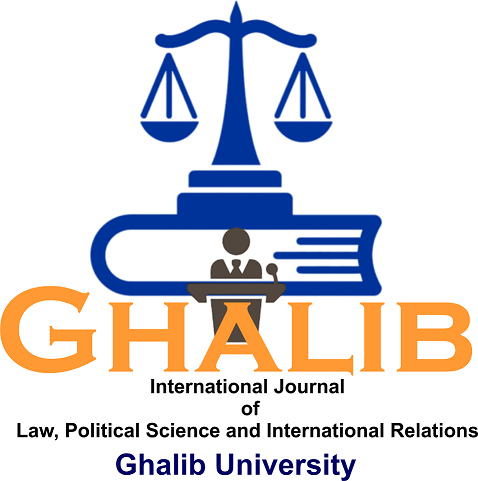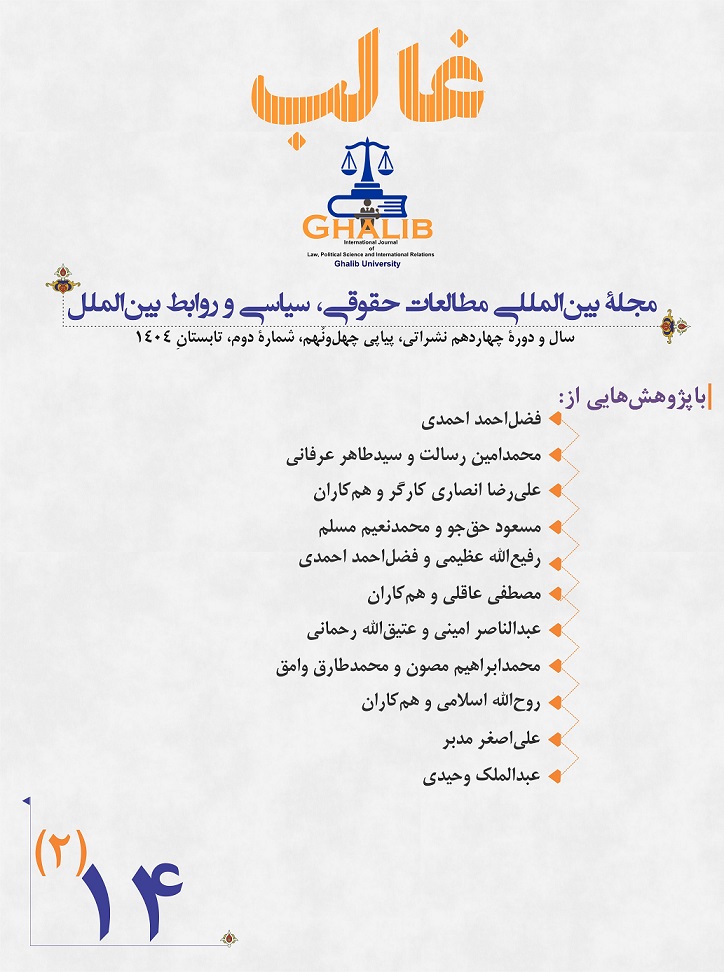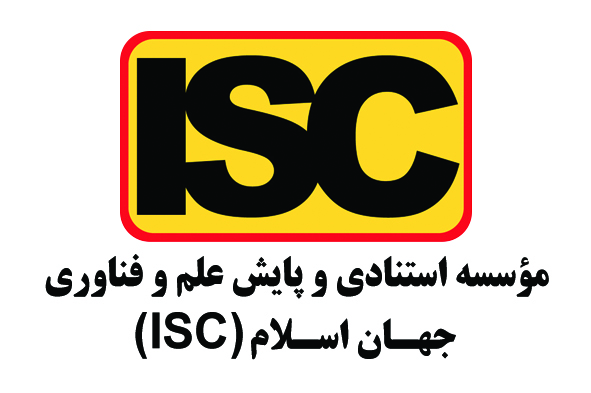تأثیر هیدروپُلیتیک منطقهیی حکومت امارت اسلامی افغانستان بر همگراییِ منابع آبی فرامرزی
DOI:
https://doi.org/10.58342/ghalibqj.V.14.I.2.13واژهگانِ کلیدی:
هیدروپلیتیک، هیدروهژمونیک، هیدرورئالیزم، همگرایی، امارت اسلامی افغانستانچکیده
سیاستهای آبی منطقهیی بهعنوان یکی از مفاهیم کلیدی در مطالعات ژئوپلیتیک آب، بر نقش قدرتهای دولتی در کنترول منابع آبی فرامرزی تأکید دارد. افغانستان، بهعنوان کشوری با منابع آب سطحی قابلتوجه، نقش راهبردی در معادلات آبی منطقهیی ایفا میکند. با رویکار آمدن حکومت امارت اسلامی، در سال ۲۰۲۱ م. سیاستهای آبی این کشور در سطح داخلی و منطقهیی دستخوش تغییراتی شده است، که میتواند بر توازن قدرت هیدروپلیتیکی تأثیرگذار باشد. سؤال اصلی تحقیق این است که هیدروپلیتیک منطقهیی امارت اسلامی چه تأثیری بر همگرایی منابع آبی فرامرزی داشته است؟ برای پاسخ به این پرسش، روش تحقیق تحلیلی- تبیینی بهکار گرفته شده و برای جمعآوری اطلاعات و مواد خام، از ابزارهای کتابخانهیی استفاده شده است. یافتهها نشان میدهند که حکومت کنونی افغانستان به دلیل برخورداری از استقلال سیاسی، حق حاکمیت آبی، موقعیت دست بالا در برابر کشورهای همسایه و وابستهگی آنها به آبهای افغانستان، این کشور را در جایگاهی خاص قرار داده است؛ بااینحال، زمینۀ همگرایی منابع آبی هنوز وجود دارد؛ مشروط بر اینکه عدم امنیتیسازی آب، سیاستزدایی از مسأله آبی، طرحهای بدیل کشاورزی سنّتی و استفاده از بندرهای تجاری همسایهگان برای سیاستهای امارت اسلامی مدنظر قرار گیرد.
سرچشمهها/ منابع
۱. اخباری، ابوالفضل؛ اسماعیل پورروشن، علی اصغر؛ رنجبر، محسن و بتول باهک. (۱۳۹۹). «تحلیل هیدروپلیتیکی ساختار نوین روابط بین الملل (مطالعه موردی: ایران و افغانستان)». فصلنامة علمی – پژوهشی جغرافیا (برنامهریزی منطقهای). 10(2). ۴۱-۱۵. http://www.jgeoqeshm.ir/article_109356_en.html
۲. اندیک، بهنام؛ میانآبادی، حجت. (۱۴۰۲). «هیدروپلیتیک رودخانة کابل: نقش آب در تعاملات افغانستان و پاکستان». مدیریت آب و آبیاری، 13(1). ۲۰۹-۲۳۷. https://jwim.ut.ac.ir/article_91948_64f018e8ef05c5617c8860f13b539ca1.pdf
۳. انصاری، فاروق. (۱۳۹۶). «هیدروپلیتیک و تأثیر آن بر روابط افغانستان و پاکستان». اندیشة معاصر. 3(9). ۲۵ – ۳۶.https://andisha.org/uploads/journals/Andishe-moaser/and-moaser09/far-ansari-25.pdf
۴. انصاری کارگر، علیرضا. (۱۴۰۲). «تبیین مرجعانگاری جامعة بینالملل و جامعة جهانی بر کنشگران معترض در نظام بینالملل». فصلنامه علمی – پژوهشی غالب، 12(3). ۱۶۵ – ۱۸۱.https://doi.org/10.58342/ghalibqj.V.12.I.3.11
۵. براون، کریس؛ آینلی، کریستن. (۱۳۹۱). فهم روابط بینالملل. ترجمة محمد جواد رنجکش و فاطمه صلواتی طرقی. تهران: نشر مرندیز.
۶. دهشیری، محمدرضا؛ حکمتآرا، حامد. (۱۳۹۷). «دیپلماسی آب ایران در قبال همسایگان». فصلنامة سیاستهای راهبردی و کلان. ۶(۴).۵۹۶ – ۶۱۶.
https://www.jmsp.ir/article_62700_07d59babb73bb51c09bf07784b132eca.pdf?lang=en
۷. رستمی، فرزاد؛ نادری، مسعود. (۱۳۹۴). «بحران کمآبی و گسست در امنیت ملّی». فصلنامة پژوهشهای روابط بین الملل. 1(15). ۱۹۱ – ۱۶۱.
https://www.iisajournals.ir/article_41980_947172d1ad85611f518cdc1a37f83610.pdf?lang=en
۸. رشیدینژاد، احمد؛ کاویانیراد، مراد؛ دستنائی، افشین متقی. (۱۴۰۲). «نسبت تطابق رویکردهای هیدروپلیتیک و اصول حاکم بر رودهای بینالمللی». مجلة پژوهشی جغرافیای انسانی. 8(1). پیاپی ۲۹.۴۰ – ۱۵.https://doi.org/10.22067/pg.2022.72088.1084
۹. ذکی، یاشار؛ بدیعی ازنداهی؛ گلزاری، امید اسلام جمال. (۱۴۰۱). «الگویابی بنیانهای هیدروپلیتیک همگرایانه و واگرایانه بین ایران، افغانستان و ترکمنستان در حوضههای آبریز مرزهای شرقی». فصلنامة روابط خارجی. 14(۵۴). ۱۳۵ – ۹۸.
۱۰. ذکی، یاشار؛ دلشازاد، جلیل؛ کریمی، بایرام. (۱۳۹۴). «بررسی و تحلیل هیدروپلیتیک رودخانههای بینالمللی با تأکید بر رودخانة مرزی ارس». فصلنامة جغرافیای نظامی و امنیتی. 1(1). ۳۷ – ۶۵ . https://smg.ihu.ac.ir/article_201103_4c5c799cf2df1900fd85254bdcf1b9a3.pdf
۱۱. سینایی، وحید؛ جمالی، جواد. (۱۳۹۷). «دیپلُماسی اقتصادی ج.ا.ایران در افغانستان و مدیریت اختلافات آبی دو کشور (با کاربست رویکرد اقتصاد نهادگرا)». فصلنامة مطالعات راهبردی سیاستگذاری عمومی. 8(۲۸). ۶۹ – ۹۳.https://sspp.iranjournals.ir/article_33907_cae8269dce9df8509664e079164d3647.pdf?lang=en
۱۲. صادقی، شمسالدین. (۱۳۹۵). «هیدروپلیتیک و امنیت ملّی (مطالعة موردی: کشورهای منطقة خلیج فارس». فصلنامة راهبرد. 25(۸۱). ۱۴۴ – ۱۱۷.https://rahbord.csr.ir/article_124610_en.html
۱۳. قاسمی، فرهاد. (۱۳۹۰). نظریة روابط بینالملل و مطالعات منطقهای. تهران، نشر میزان.
۱۴. قریشی، سیده زهرا؛ میانآبادی، حجت؛ شفائی، مسعود موسوی. (۱۳۹۸). «نقش قدرت در دیپلماسی آب». تحقیقات منابع آب ایران. 15(۲). ۲۶۴ – ۲۴۲.
https://www.iwrr.ir/article_85778_1767683237d76e35bf39d60694ae7104.pdf?lang=en
۱۵. قوام، عبدالعلی. (۱۳۹۰). روابط بینالملل نظریهها و رویکردها. چ پنجم. تهران: سمت.
۱۶. مختاریهشی، حسین؛ کاویانیراد، مراد. (۱۳۹۸). «پردازش مفهوم هیدروپلیتیک». نشریه آب و توسعه پایدار. 6(۲). ۱۵ – ۲۶.
۱۷. مورگانتا، هانس جی. (۱۳۹۳). سیاست میان ملتها: تلاش در راه قدرت و صلح. ترجمة حمیرا مشیرزاده. چ سوم. تهران: ادارة نشر وزارت امور خارجه.
۱۸. مشیرزاده، حمیرا. (۱۳۹۳). تحول در نظریههای روابط بینالملل. چ نهم. تهران: سمت.
۱۹. میانآبادی، حجت؛ قریشی، سیده زهرا. (۱۴۰۰). «بازتعریف مؤلفههای امنیت آبی». تحقیقات منابع آب ایران. 17(۱). ۲۶۱ – ۲۳۹.https://www.iwrr.ir/article_130994_3139b26b8a771f43e4ad988777a0a0f6.pdf?lang=en
۲۰. موسوی، سید مهدی؛ زارعی، بهادر؛ پیشگاهیفرد، زهرا و دیگران. (۱۴۰۰). «تبیین نظری بسترها و زمینههای روابط ژئوپلیتیک و ارائه مدل پیشنهادی». پژوهشهای جغرافیای انسانی. ۵۳(۳). ۸۳۲ – ۸۱۱.
۲۱. واعظی، محمود. (۱۳۹۰). بحرانهای بینالمللی، تحلیل نظری و مطالعة موردی. تهران: مرکز چاپ و انتشارات وزات امور خارجه.
۲۲. حکمتآرا، حامد؛ ذکی، یاشار؛ پیشگاهیفرد، زهرا و بهادر زارعی. (۱۴۰۳). «نواندیشی در چارچوب مفهومی هیدروهژمونی (آب چیرگی)، با تأکید بر حوض آبریز فرامرزی ارس». تحقیقات منابع آب ایران. 20(۱). ۱۴۶ – ۱۲۶.
۲۳. خسروانی، انیس؛ توحیدفام، محمد. (۱۳۹۹). «سیاست منابع آب ترکمنستان در فضای هیدروپلیتیک آسیای مرکزی». فصلنامة آسیای مرکزی و قفقاز. ۱۰۹. ۱ – ۳۱.http://ca.ipisjournals.ir/article_45665_en.html
۲۴. گرگیچ، فرهاد؛ خزایی، ضیاء. (۱۳۹۸). «بررسی تأثیر هیدروپلیتیک هیرمند بر امنیت جمهوری اسلامی ایران». فصلنامة تخصصی علوم سیاسی. 14(47). ۴۹ – ۷۰.http://sanad.iau.ir/en/Journal/psq/Article/1102062
۲۵. فرجی، محمدرضا. (۱۴۰۰). «قدرتهای نوظهور و نظم هژمونیک». فصلنامة مطالعات راهبردی. 24(2). ۱۸۳ – ۲۰۹..https://quarterly.risstudies.org/article_139331_600664cc2cad421b34316fcd3d0a2b07.pdf?lang=en
Bréthaut, Christophe; Ezbakhe, Fayçal; McCracken, Michael; Wolf, Aaron T.; Dalton, Jennifer. (2022). Exploring discursive hydropolitics: A conceptual framework and research agenda. International Journal of Water Resources Development, 38(3), 464–479. https://doi.org/10.1080/07900627.2021.1944845
Braden, Kathleen E.; Shelley, Fred M. (2005). Comprehensive Geopolitics (A. R. Farshchi & H. R. Rahnama, Trans.). Islamic Revolutionary Guard Corps.
Distance Learning Module 14. (2022, September 22). International Programs. University of Nebraska Omaha. Retrieved from https://www.unomaha.edu/international-studies-and-programs/center-for-afghanistan-studies/academics/transboundary-water-research/DLM14/DLM14.php
Ezamy, Sayed Omran. (2020). Hydropolitics of Afghanistan. The Directorate of Public Information and Communications of the Afghanistan Academy of Sciences.
Loodin, Nemat; Warner, Jeroen. (2022). A Review of Hydro-Hegemonic Dynamics on the Transboundary Harirud River Basin: 2001–Present. Water, 14(21), Article 21. https://doi.org/10.3390/w14213442
Momeni, Mohammad; Tonzai, Mohammad Taher. (2020). Economic Diplomacy in Afghanistan: A Post-Taliban Analysis. Iranian Review of Foreign Affairs, 11(32), 541–565.
Piltan, Farhad; Sedigh Bathaeei Asl, Mohammad. (2017). Principles and Mechanisms of Environmental Cooperation between Iran and Its Neighbors in the Areas of Common Rivers Waters. Socio-Cultural Strategy, 5(4), 91–122.
Shokory, Jawad Ahmad Nuristani; Schaefli, Bettina; Lane, Stuart N. (2023). Water resources of Afghanistan and related hazards under rapid climate warming: A review. Hydrological Sciences Journal, 68(3), 507–525. https://doi.org/10.1080/02626667.2022.2159411
Thomas, Vincent; Warner, Jeroen. (2015). Hydropolitics in the Harirud/Tejen River Basin: Afghanistan as hydro-hegemon? Water International, 40(4), 593–613. https://doi.org/10.1080/02508060.2015.1059164
Vareje Kazemi, Mohammad. (2022, May 19). Analysis of Afghanistan’s Hydrohegemony. Institute for East Strategic Studies. Retrieved from https://www.iess.ir/fa/analysis/3079/
Zeitoun, Mark; Warner, Jeroen. (2006). Hydro-hegemony – a framework for analysis of trans-boundary water conflicts. Water Policy, 8(5), 435–460. https://doi.org/10.2166/wp.2006.054
References
Akhbari, Abolfazl; Esmaeil Pourroshan, Ali Asghar; Ranjbar, Mohsen; and Batoul Bahak. (2020). "Hydropolitical Analysis of the New Structure of International Relations (Case Study: Iran and Afghanistan)." Scientific-Research Quarterly of Geography (Regional Planning), 10(2), 15–41. http://www.jgeoqeshm.ir/article_109356_en.html [In Persian]
Andik, Behnam; Mianabadi, Hojjat. (2023). "Hydropolitics of the Kabul River: The Role of Water in Afghanistan-Pakistan Relations." Water and Irrigation Management, 13(1), 209–237. https://jwim.ut.ac.ir/article_91948_64f018e8ef05c5617c8860f13b539ca1.pdf [In Persian]
Ansari, Farough. (2017). "Hydropolitics and Its Impact on Afghanistan-Pakistan Relations." Contemporary Thought, 3(9), 25–36. https://andisha.org/uploads/journals/Andishe-moaser/and-moaser09/far-ansari-25.pdf [In Persian]
Ansari Kargar, Alireza. (2023). "Explaining the Referencing of International and Global Society over Protest Actors in the International System." Ghalib Scientific-Research Quarterly, 12(3), 165–181. https://doi.org/10.58342/ghalibqj.V.12.I.3.11 [In Persian]
Brown, Chris; Ainley, Kristen. (2012). Understanding International Relations. Translated by Mohammad Javad Ranjkesh and Fatemeh Salavati Tareqi. Tehran: Marendiz Publishing. [In Persian]
Dehshiri, Mohammadreza; Hekmat Ara, Hamed. (2018). "Iran’s Water Diplomacy towards Neighbors." Strategic and Macro Policies Quarterly, 6(4), 596–616. https://www.jmsp.ir/article_62700_07d59babb73bb51c09bf07784b132eca.pdf?lang=en [In Persian]
Rostami, Farzad; Naderi, Masoud. (2015). "Water Scarcity Crisis and Disruption in National Security." International Relations Research Quarterly, 1(15), 161–191. https://www.iisajournals.ir/article_41980_947172d1ad85611f518cdc1a37f83610.pdf?lang=en [In Persian]
Rashidinejad, Ahmad; Kaviani Rad, Morad; Dastnaei, Afshin Motaghi. (2023). "Compatibility of Hydropolitical Approaches and Principles Governing International Rivers." Human Geography Research Journal, 8(1), Issue 29, 15–40. https://doi.org/10.22067/pg.2022.72088.1084 [In Persian]
Zaki, Yashar; Badiyi Azandahi; Golzari, Omid Eslam Jamal. (2022). "Modeling the Foundations of Convergent and Divergent Hydropolitics among Iran, Afghanistan, and Turkmenistan in the Eastern Border Basins." Foreign Relations Quarterly, 14(54), 98–135. [In Persian]
Zaki, Yashar; Delshazad, Jalil; Karimi, Bayram. (2015). "Review and Analysis of the Hydropolitics of International Rivers with Emphasis on the Aras Border River." Military and Security Geography Quarterly, 1(1), 37–65. https://smg.ihu.ac.ir/article_201103_4c5c799cf2df1900fd85254bdcf1b9a3.pdf [In Persian]
Sinaei, Vahid; Jamali, Javad. (2018). "The Economic Diplomacy of the Islamic Republic of Iran in Afghanistan and Managing Water Disputes between the Two Countries (Applying the Institutional Economics Approach)." Strategic Studies of Public Policy Quarterly, 8(28), 69–93. https://sspp.iranjournals.ir/article_33907_cae8269dce9df8509664e079164d3647.pdf?lang=en [In Persian]
Sadeghi, Shamseddin. (2016). "Hydropolitics and National Security (Case Study: Persian Gulf Countries)." Strategic Studies Quarterly, 25(81), 117–144. https://rahbord.csr.ir/article_124610_en.html [In Persian]
Ghasemi, Farhad. (2011). Theory of International Relations and Regional Studies. Tehran: Mizan Publishing. [In Persian]
Ghoreishi, Seyedeh Zahra; Mianabadi, Hojjat; Shafaei, Masoud Mousavi. (2019). "The Role of Power in Water Diplomacy." Iranian Water Resources Research, 15(2), 242–264. https://www.iwrr.ir/article_85778_1767683237d76e35bf39d60694ae7104.pdf?lang=en [In Persian]
Ghavam, Abdolali. (2011). International Relations: Theories and Approaches (5th ed.). Tehran: SAMT Publishing. [In Persian]
Mokhtari Heshi, Hossein; Kaviani Rad, Morad. (2019). "Processing the Concept of Hydropolitics." Water and Sustainable Development Journal, 6(2), 15–26. [In Persian]
Morgenthau, Hans J. (2014). Politics Among Nations: The Struggle for Power and Peace. Translated by Homeira Moshirzadeh. 3rd ed. Tehran: Publishing Department of Ministry of Foreign Affairs. [In Persian]
Moshirzadeh, Homeira. (2014). Transformation in International Relations Theories (9th ed.). Tehran: SAMT Publishing. [In Persian]
Mianabadi, Hojjat; Ghoreishi, Seyedeh Zahra. (2021). "Redefining the Components of Water Security." Iranian Water Resources Research, 17(1), 239–261. https://www.iwrr.ir/article_130994_3139b26b8a771f43e4ad988777a0a0f6.pdf?lang=en [In Persian]
Mousavi, Seyed Mehdi; Zarei, Bahador; Pishgahifard, Zahra, et al. (2021). "Theoretical Explanation of the Contexts and Grounds of Geopolitical Relations and Presentation of a Proposed Model." Human Geography Research, 53(3), 811–832. [In Persian]
Vaezi, Mahmoud. (2011). International Crises: Theoretical Analysis and Case Study. Tehran: Printing and Publishing Center of Ministry of Foreign Affairs. [In Persian]
Hekmat Ara, Hamed; Zaki, Yashar; Pishgahifard, Zahra; Zarei, Bahador. (2024). "New Perspectives in the Conceptual Framework of Hydro-Hegemony, with Emphasis on the Transboundary Aras Basin." Iranian Water Resources Research, 20(1), 126–146. [In Persian]
Khosravani, Anis; Tohidfam, Mohammad. (2020). "Turkmenistan’s Water Resources Policy in the Hydropolitical Space of Central Asia." Central Asia and Caucasus Quarterly, 109, 1–31. http://ca.ipisjournals.ir/article_45665_en.html [In Persian]
Gorgij, Farhad; Khazaei, Zia. (2019). "Examining the Impact of Hirmand's Hydropolitics on the Security of the Islamic Republic of Iran." Specialized Quarterly of Political Science, 14(47), 49–70. http://sanad.iau.ir/en/Journal/psq/Article/1102062 [In Persian]
Faraji, Mohammadreza. (2021). "Emerging Powers and the Hegemonic Order." Strategic Studies Quarterly, 24(2), 183–209. https://quarterly.risstudies.org/article_139331_600664cc2cad421b34316fcd3d0a2b07.pdf?lang=en [In Persian]
Bréthaut, Christophe; Ezbakhe, Fayçal; McCracken, Michael; Wolf, Aaron T.; Dalton, Jennifer. (2022). Exploring discursive hydropolitics: A conceptual framework and research agenda. International Journal of Water Resources Development, 38(3), 464–479. https://doi.org/10.1080/07900627.2021.1944845
Braden, Kathleen E.; Shelley, Fred M. (2005). Comprehensive Geopolitics (A. R. Farshchi & H. R. Rahnama, Trans.). Islamic Revolutionary Guard Corps.
Distance Learning Module 14. (2022, September 22). International Programs. University of Nebraska Omaha. Retrieved from https://www.unomaha.edu/international-studies-and-programs/center-for-afghanistan-studies/academics/transboundary-water-research/DLM14/DLM14.php
Ezamy, Sayed Omran. (2020). Hydropolitics of Afghanistan. The Directorate of Public Information and Communications of the Afghanistan Academy of Sciences.
Loodin, Nemat; Warner, Jeroen. (2022). A Review of Hydro-Hegemonic Dynamics on the Transboundary Harirud River Basin: 2001–Present. Water, 14(21), Article 21. https://doi.org/10.3390/w14213442
Momeni, Mohammad; Tonzai, Mohammad Taher. (2020). Economic Diplomacy in Afghanistan: A Post-Taliban Analysis. Iranian Review of Foreign Affairs, 11(32), 541–565.
Piltan, Farhad; Sedigh Bathaeei Asl, Mohammad. (2017). Principles and Mechanisms of Environmental Cooperation between Iran and Its Neighbors in the Areas of Common Rivers Waters. Socio-Cultural Strategy, 5(4), 91–122.
Shokory, Jawad Ahmad Nuristani; Schaefli, Bettina; Lane, Stuart N. (2023). Water resources of Afghanistan and related hazards under rapid climate warming: A review. Hydrological Sciences Journal, 68(3), 507–525. https://doi.org/10.1080/02626667.2022.2159411
Thomas, Vincent; Warner, Jeroen. (2015). Hydropolitics in the Harirud/Tejen River Basin: Afghanistan as hydro-hegemon? Water International, 40(4), 593–613. https://doi.org/10.1080/02508060.2015.1059164
Vareje Kazemi, Mohammad. (2022, May 19). Analysis of Afghanistan’s Hydrohegemony. Institute for East Strategic Studies. Retrieved from https://www.iess.ir/fa/analysis/3079/
Zeitoun, Mark; Warner, Jeroen. (2006). Hydro-hegemony – a framework for analysis of trans-boundary water conflicts. Water Policy, 8(5), 435–460. https://doi.org/10.2166/wp.2006.054
چاپ شده
ارجاع به مقاله
شماره
نوع مقاله
مجوز
حق نشر 2025 علیرضا انصاری کارگر،بصیراحمد حصین،عتیقالله رحیمی

این پروژه تحت مجوز بین المللی Creative Commons Attribution 4.0 می باشد.













